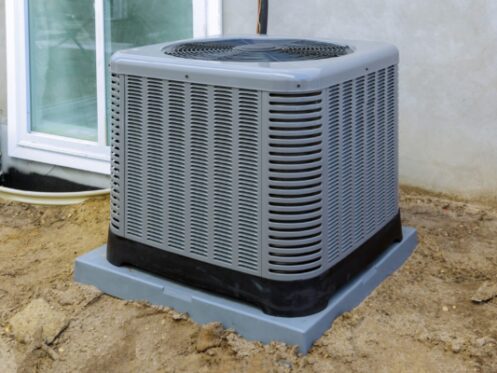For an average residential or commercial building in Florida, heating and cooling costs represent almost half the energy consumption. As such, improving your HVAC system efficiency is critical for sustainability and overall comfort in your home.
Understanding HVAC System Efficiency
HVAC system engineers measure efficiency using the SEER rating (seasonal energy efficiency ratio). The SEER rating is determined over the course of a whole season. It takes the total output of energy and divides it by the amount of energy used. In general, the higher the SEER rating, the more efficient the unit. However, a unit’s SEER rating represents its maximum efficiency; there are things that can cause a unit–even one with a higher SEER rating–to run with diminished efficiency.
Signs of an Inefficient HVAC System
Increased energy cost is the first obvious sign of an inefficient system. If you haven’t been using your system more yet you’re paying a significantly higher amount for your energy bill, something could be wrong with your system.
Suppose you don’t look at your bills that often; watch out for any changes in the comfort levels of your home. If you are noticing hot or cold spots or it seems like your home’s temperature isn’t optimal even though your system is always running, it may be a good idea to call a technician from American Air & Heat.
Another thing to watch out for is the humidity that is so often a problem in Oviedo homes. If your HVAC unit isn’t controlling the humidity the way that it used to, you’ll want to give us a call as humidity can damage your home and belongings like photos, furniture, and artwork.
A very obvious sign of an inefficient HVAC is noise. For instance, banging, screeching, humming, and buzzing sounds indicate a problem with some of the major components of your system. An efficient HVAC system should not be noticeable when it’s running.
If you see ice on your compressor coils, that’s an indication of low refrigerant levels. Low refrigerant levels can reduce the cooling efficiency of your system by up to 20%. Consider calling a professional to deal with this problem. Refrigerants are extremely toxic; in fact, a technician must get an EPA certification just to handle them.
Fortunately, there are a number of ways that you can help your HVAC unit run at its most efficient.
Close Your Windows and Doors
When you open your door or windows, you are letting outside air in and letting the conditioned air out. If you’re going to be going in and out of your house for an extended period of time doing yard work or moving furniture in or out, it may be a good idea to set the thermostat to a higher temperature temporarily so that the system doesn’t have to work as hard.
Insulate Your Home Properly
Even with your windows and doors closed, your house could still potentially lose energy if there are any gaps or drafts. There are myriad types of insulation materials on the market, ranging from fiberglass to cellulose and even spray foam. Nonetheless, the most important thing to look for is the “R-value,” which is a measure of how good an insulator is. A higher R-value means more insulation and, subsequently, higher energy efficiency for your HVAC system.
Consider the loft, floor, walls, ceiling, and attic as well when it comes to insulation. Also, look out for any air leaks in doorways or windows.
Replace Your Air Filters Regularly
Your HVAC system’s air filters catch dust, dirt, and debris from circulating through your ducts. The more particles that accumulate in your filter, the harder your unit has to work to get air through it. This can cause the motors and other components to wear out quicker than they should, leading to costly repairs or even replacement of your system.
Make sure that you replace or clean your air filters every one to three months so that your system remains at peak efficiency levels. However, if you have a pet or your house is in a particularly dusty area, you may need to do this more frequently. Also, check your filters. Some are washable, and some are meant to be replaced more often than others.
Upgrade or Repair a Faulty Thermostat
Your thermostat is the brain of your air conditioning system. It tells it when to turn on or off, how much air to circulate, and what temperature to maintain.
If your thermostat is faulty or malfunctioning, it will send incorrect signals to your system, causing it to work more than necessary and resulting in energy waste. It will also make your home very uncomfortable to stay in.
Upgrading to an advanced, programmable thermostat can help you save energy and money with its automatic heating and cooling settings. It will also allow you to set temperatures for different times of the day so that your system isn’t running when it doesn’t need to be. Some even have apps that let you control your settings remotely.
Provide a Shade for Your Condenser
Your HVAC condenser is the outdoor unit that pulls all of the heat from your home and dissipates it into the atmosphere. If it gets too hot from sitting in the sun, it may overwork itself trying to cool down the air around it.
One way to help with this is by providing some shade for your condenser. You can do this through awnings or even trees if possible. Just make sure you don’t block the airflow. A 2-foot clearance space is optimal for the condenser’s efficiency.
If your unit is placed on the side of the house that gets a lot of sun or wind, consider relocating it. In Florida, the north side of the house is usually cooler since it gets less direct sunlight.
Consider a Zone System
If you are looking to maximize your efficiency, you may want to consider installing a zone control system. This involves setting up separate thermostats in different parts of the house, which will allow you to customize the temperature and airflow for each area.
This means if one person wants it warm in their bedroom and another wants it cool in the living room, then this system can make that happen. Similarly, you won’t have to waste energy heating or cooling empty rooms.
Have Your System Serviced Regularly
Your HVAC system is a machine with moving parts, just like a car. After some time, there are some parts that will wear out and need restoration. You can avoid a lot of problems and save money by getting regular maintenance for your system.
Have a certified technician come in at least once or twice each year to inspect your system, clean all the parts, and make any necessary repairs or replacements. This will extend the life of your unit and keep it running efficiently for years to come.
Install a New and Improved System
If your air conditioning system is older than 15 years, you may want to consider investing in a new unit. Technology has come a long way since then, and new, energy-efficient models will help you reduce your energy costs while still keeping your home comfortable.
The U.S. Department of Energy sets the minimum allowable for SEER ratings, and while you don’t have to replace your system just because it no longer meets these minimums, keep in mind that the minimum for Florida was raised to SEER 15 as of January 2023, so if you still have a unit that’s operating at 10 SEER or lower, now might be the time to upgrade.
Rely on the Pros
Making sure your air conditioning system is running as efficiently as possible and using the above tips will help you save money, reduce energy costs and even extend the life of your unit. American Air & Heat is a family-owned business that’s been providing top-notch HVAC services in Oviedo and all of central Florida for over 35 years. Our technicians are background-checked, NATE-certified, and trained to handle all makes and models of systems. We offer 24/7 emergency services and flexible financing options, and all our services are backed by a 100% satisfaction guarantee. Call American Air & Heat today to schedule an appointment.

